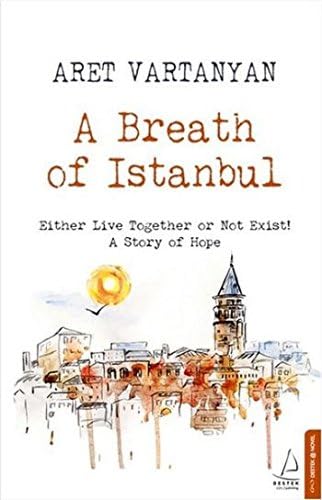A Breath of Istanbul, a novel by Aret Vartanyan, an author whose name I had never heard before, has all the ingredients to make me curious: set in the fascinating city of Istanbul, the story is told by a narrator who comes from a mixed Greek-Armenian family. He has spent years in Greece, but after a divorce the still comparatively young man returns to his birthplace Istanbul. While we readers get to know him, his new girlfriend Zeynep, and his other friends who in a way represent different layers of the Turkish society – there is a couple that is obviously cheating on each other, another (gay) couple, an Armenian craftsman, a Kurdish childhood friend working in the rather shady construction business, but also workers, a homeless boy, a drag queen, and so on – the story picks up speed in the moment when a group of elderly people approach the narrator to help them with a project they dream of: they want to establish a home for elderly people of different ethnic groups and also give those old Greeks and Armenians that left the country but still feel a strong longing for their birthplace, a possibility to live their last years peacefully in the city of their dreams: Istanbul. But the group of elderly people who want to set a good example for the coexistence of people of different ethnic background are not the only one’s to have an eye on the property that would be just perfect for this project…
An interesting story, no doubt. There were parts I really enjoyed, like the description of a visit in Büyükada, the biggest of the Princes’ Islands, which had almost a touch of Cechov, or the childhood memories of the narrator. What put me off on the other side were the fact that the way in which the story unfolded was very conventional and predictable, and also the narrator himself. A narrator of such a novel does not need to be necessarily a nice person, and he can be even unreliable – but it should be at least an interesting character. To me, the narrator of this book was not interesting. We never learn exactly what he is doing for a living – he seems to be something like a writer, although the reader wonders what exactly he is writing, and where exactly does the money come from to enjoy a rather carefree life without ever bothering to have a regular job or to think about how to pay his rent -, on the other hand, everybody (or almost everybody) loves him for reasons I fail to understand. The most gorgeous women want to sleep with him all the time, because, you know, they “feel his vibes”. Well, I am not a woman, and I didn’t feel them. Strangely, also the men in the book fall for his charm, everybody does incredible things, such as the jeweller who hands over a fortune just like that to the narrator, because our narrator guy is just great, and “his” project (which is actually the project of some brave old ladies), and the shady construction “business man” almost immediately becomes a helper in the project, just because he and the narrator turn out to be childhood friends. You get the drift. It’s all so realistic, you know.
The narrator’s opinions and pseudo-philosophical musings about women, love, friendship, life, history, are so full of clichés and platitudes, and at the same time he is so full of himself that it would have reminded me more than once of Paulo Coelho, an author about whose writing I tell you my honest opinion here, even if the name of that dreaded writer would not have been explicitly mentioned twice in this novel.
A little bit more of Orhan Pamuk, and a little bit less of Paulo Coelho, and it could have been a reasonably good book.

Aret Vartanyan: A Breath of Istanbul (transl. by Kader Cekerek), Destek, Istanbul 2015
© Thomas Hübner and mytwostotinki.com, 2014-7. Unauthorized use and/or duplication of this material without expressed and written permission from this blog’s author and/or owner is strictly prohibited. Excerpts and links may be used, provided that full and clear credit is given to Thomas Hübner and mytwostotinki.com with appropriate and specific direction to the original content.



 Facebook
Facebook RSS
RSS Twitter
Twitter